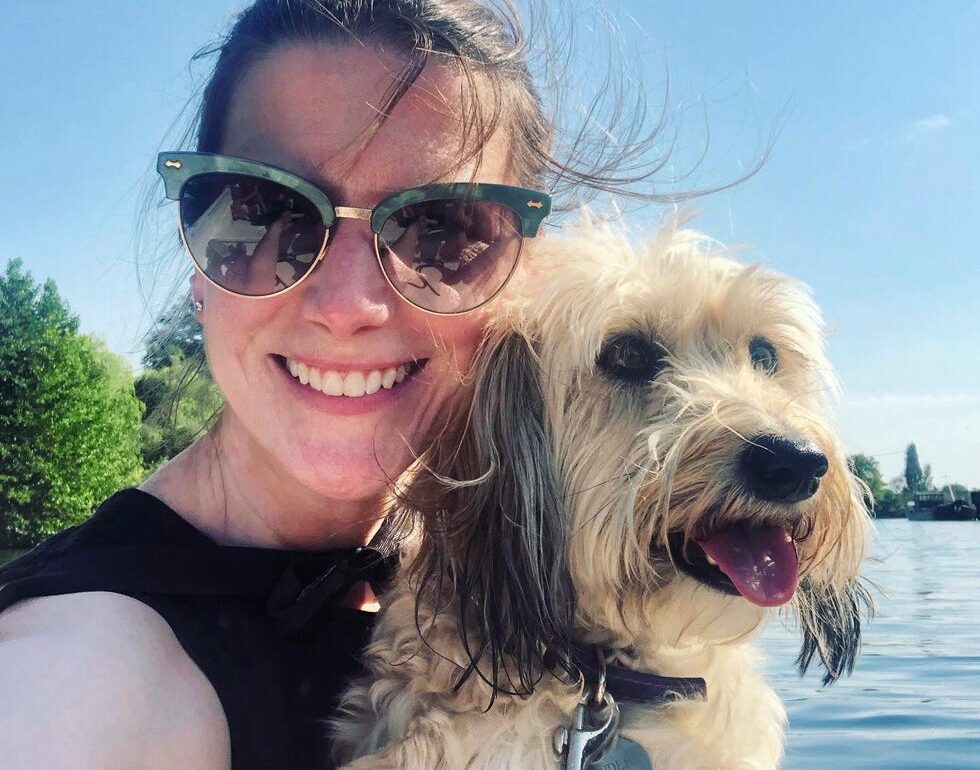“Have a great life, little dog!” the pet courier hollered out of his window after thrusting a bedraggled puppy into my arms and jumping back into his van. He was in a hurry; we had met in a dark and rainy motorway services carpark and Cinders wasn’t the only dog he needed to drop off that night.
This was how I first met the rescue we’d adopted through Wild at Heart, a charity that connected UK families with dogs in need. They organised her pet passport and transport from a shelter in Cyprus, and this unceremonious handover marked the end of her long journey to a forever home. It also marked the moment I became the owner of the best dog in the world.
At the time, I wondered if I’d been handed the right puppy. Was her snout as long as that in the pictures? Her tail was so matted that it thumped against my arm like a rolling pin, but I could see how she’d got her name: her pale fur looked as though it had been dusted with ashes.
Growing up, I was devoted to my pet Corgi (also, coincidentally, the best dog in the world) and I had decided that my young family should also experience the comfort and joy of a dog’s constant, benign presence.
After an interview and a house inspection – all responsible rehoming charities insist on this – Wild at Heart suggested Cinders as a good fit. Non-shedding, she wouldn’t aggravate my husband’s allergies and, most importantly, she was sweet enough to cope with all the affection that my two boys would lavish on her.
Having visited Cyprus before, I’d seen the huge street dog population first-hand – it’s estimated at around 200,000. However, many experts recommend adopting from a UK shelter instead. “So many dogs here need homes, and many unscrupulous rescue charities work abroad,” says Nina Downing, a veterinary nurse at the PDSA, the UK’s largest veterinary charity. She’s seen what happens when the medical checks aren’t completed and worries that some street dogs “will never adjust to a home environment, causing heartbreak for their new family”.
Because most UK shelters can better assess the animals, they’ll give you a fuller picture of each pet’s needs – whether that’s healthcare or socialisation – before you commit. I realise now what a risk we took in adopting a dog we’d never met, and how lucky we were that she didn’t struggle to settle into her new life.
Cinders arrived in the UK underweight, but soon began turning down any food she didn’t find tasty enough; she still dramatically spits out any vegetable – ptooey! – that we sneak into her bowl. House training went relatively smoothly, but nights were another story. Unsettled by the quiet, she howled so piteously on her own that my husband and I took turns lying on the floor by her crate.
These days, Cinders is a world-class snoozer, groaning with satisfaction as she luxuriates in one of her many beds. She has a huge repertoire of different sleeping positions, and I’ll watch her napping next to my desk the way some people gaze at the view out of their window. On her walks, she is mostly airborne, galloping with all four paws off the ground and ears flapping.
My camera roll is full of Cinders bounding across beaches, meadows and fields. Forest outings where she can dash after squirrels, scramble through brush and, on a good day, roll in something disgusting are her favourite.
Dogs are famously appreciative of their owners, and rescue dogs even more so. Cinders knows she caught a break. When you return home after an absence or when she really wants to join you on the sofa, she’ll try to ingratiate herself by flashing you a wobbly, awkward grin. Her quivering “smile” does not look entirely sincere, or sane, but we love her for trying.
Traces of her street days remain, however. She will run with our dogwalker’s pack or casually sniff other pooches in the park, but with one of her family at the other end of the lead, she becomes fiercely possessive, occasionally snarling at other dogs passing by. We’ve deployed treats and distraction techniques to train her out of it, but it’s still a work in progress.
Top tip
Rescue centres will be honest about each pet’s needs because they want a successful match, so do ask for lots of information before committing.
Still, she has come a long way from the dishevelled puppy I brought home seven years ago. She’s blonde now, with only a sprinkle of the grey fur that inspired her name, and her tail is silky and magnificent. Nothing about the long slope of her snout, punctuated by a rubbery black nose, her kohl-rimmed eyes or lack of chin calls to mind a specific breed; like most street dogs, she’s working with very disparate genetic material. Mixed-up DNA is one of the advantages that “Heinz 57” dogs have over pedigrees. “A typical mongrel is usually pretty healthy,” agrees Nina, our veterinary expert. “It’s purebreds or ‘designer’ crossbreeds that are more likely to develop devastating breed health conditions – though of course you should always get them checked.”
My children are now teenage boys, and I love how our little dog can still access the tenderest part of their hearts. “She’s the best thing that ever happened to us,” my eldest told me years ago, and it’s still true today. It’s worked out rather well for us all.
Ask the dog expert
Veterinary nurse Nina Downing works with the PDSA, the UK’s largest veterinary charity, for pets in need…
How can you find a reputable animal shelter?
They’re not regulated, so it’s good to find references and hunt out success stories on social media. A good charity will ask an intrusive number of questions about your work/life balance, your budget and your home – it means they really care about their dog.
What questions should you ask a shelter about your rescue dog?
Do ask for lots of detail about their previous living conditions, how much socialisation they’ve had, whether they spent time in a litter or with a loving family. If they lived in a chaotic household, they’ll require more training to respect people or property. And check if your rescue centre has good aftercare support, which can be really helpful.
How can you prepare for your rescue’s arrival?
Register with a vet and arrange pet insurance that includes vet’s fees from the start. If you know the breeding of your new dog, you can read up about their breed and health history; it could give you insight into how you can meet their needs. Work out logistics in advance, from who will walk them to how you’ll budget for their care.
Any tips for early days of adopting a rescue?
It’s overwhelming for them, so try to react calmly to any unexpected behaviour. Introduce them to a safe space with cosy bedding and treats where they know they can retreat. Keep a radio or TV on if they’re used to a noisy environment, and if they’re anxious at night, don’t let them “cry it out” – they’re looking to you for reassurance.
This post was originally published on this site be sure to check out more of their content.


















































